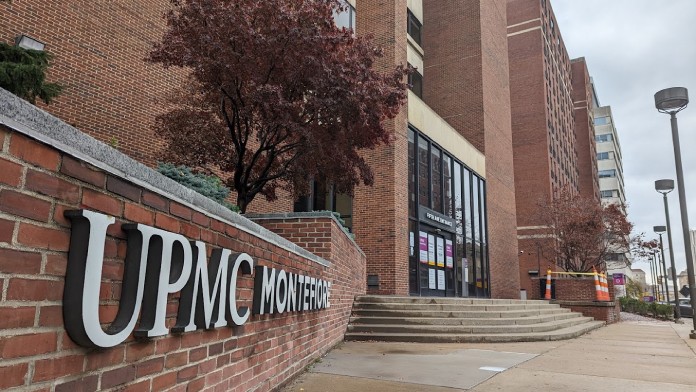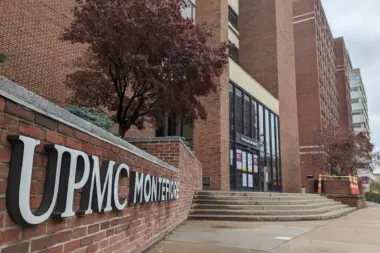About UPMC – 5th Avenue
UPMC Montefiore – 5th Avenue is part of UPMC Presbyterian in Pittsburgh, Pennsylvania. They specialize in cardiology and can help treat heart disease or other conditions that may have developed as a result of substance use disorder. Clients who need intensive addiction care services can be referred to UPMC Western Behavioral Health.
Referral to Inpatient or Outpatient Addiction Treatment
When the staff at UPMC Montefiore refers you to UPMC Western Behavioral Health, you’ll have the option of receiving inpatient or outpatient addiction care. The inpatient program includes withdrawal management services and psychiatric dual diagnosis treatment. During withdrawal management, you’ll receive medications such as methadone and buprenorphine to reduce your symptoms and cravings.
As you’re taking the medication, you’ll also be treated with behavioral therapies such as dialectical behavior therapy (DBT) and cognitive behavioral therapy. DBT will focus on teaching you skills for preventing relapse such as mindfulness and engaging in positive self talk.
You will move forward with outpatient services such as the intensive outpatient program once enough progress has been made. You’ll participate in individual and group counseling several days a week for multiple hours a day. In addition to these services, I also like that they provide pregnancy recovery support and support from a peer navigator team.
Maintaining Sobriety in Downtown Pittsburgh
The hospital is conveniently located a few minutes away from downtown Pittsburgh. One attraction that you can enjoy when you’re not in treatment is Point State Park. Some activities you can do there include hiking, biking and boating.
Latest Reviews
We care about your health and providing the highest level of patient satisfaction. We’d like to receive additional details about your visit at UPMC Montefiore in order to improve future experiences for patients. Please fill out the brief form found at UPMC.com/Feedback to speak with a patient representative.
Thank you for providing us with valuable feedback.
We appreciate you taking the time to share about your experience at UPMC Montefiore. Your feedback is very important to us and valuable to other patients looking for high-quality care.
We hope you have a wonderful day!
We appreciate you taking the time to share about your experience with the UPMC Montefiore team and for sharing your kind words about them. Your feedback is very important to us and valuable to other patients looking for high-quality care.
We hope you have a wonderful day!
Rehab Score
Gallery


Accepted Insurance
Other Forms of Payment
Medicaid is a state based program that helps lower-income individuals and families pay for healthcare. Medicaid covers addiction treatment so those enrolled can use their coverage to pay for rehab. When a program accepts Medicaid the client often pays very little or nothing out of their own pocket.
Private insurance refers to any kind of healthcare coverage that isn't from the state or federal government. This includes individual and family plans offered by an employer or purchased from the Insurance Marketplace. Every plan will have different requirements and out of pocket costs so be sure to get the full details before you start treatment.
Self-pay involves paying for treatment out of your own pocket. You can use savings or credit, get a personal loan, or receive help from family and friends to fund your treatment. If you don't have insurance or your insurance plan doesn't cover a specific program, self-pay can help ensure you still get the care you need.
Financial aid can take many forms. Centers may have grants or scholarships available to clients who meet eligibility requirements. Programs that receive SAMHSA grants may have financial aid available for those who need treatment as well. Grants and scholarships can help you pai for treatment without having to repay.
Medicare is a federal program that provides health insurance for those 65 and older. It also serves people under 65 with chronic and disabling health challenges. To use Medicare for addiction treatment you need to find a program that accepts Medicare and is in network with your plan. Out of pocket costs and preauthorization requirements vary, so always check with your provider.
Military members, veterans, and eligible dependents have access to specific insurance programs that help them get the care they need. TRICARE and VA insurance can help you access low cost or no cost addiction and mental health treatment. Programs that accept military insurance often have targeted treatment focused on the unique challenges military members, veterans, and their families face.
Addiction Treatments
Levels of Care
Outpatient Programs (OP) are for those seeking mental rehab or drug rehab, but who also stay at home every night. The main difference between outpatient treatment (OP) and intensive outpatient treatment (IOP) lies in the amount of hours the patient spends at the facility. Most of the time an outpatient program is designed for someone who has completed an inpatient stay and is looking to continue their growth in recovery. Outpatient is not meant to be the starting point, it is commonly referred to as aftercare.
Treatments
Mental health rehabs focus on helping individuals recover from mental illnesses like bipolar disorder, clinical depression, anxiety disorders, schizophrenia, and more. Mental health professionals at these facilities are trained to understand and treat mental health issues, both in individual and group settings.
Programs
Adult rehab programs include therapies tailored to each client's specific needs, goals, and recovery progress. They are tailored to the specific challenges adult clients may face, including family and work pressures and commitments. From inpatient and residential treatment to various levels of outpatient services, there are many options available. Some facilities also help adults work through co-occurring conditions, like anxiety, that can accompany addiction.
Clinical Services
Cognitive Behavioral Therapy (CBT) is a therapy modality that focuses on the relationship between one's thoughts, feelings, and behaviors. It is used to establish and allow for healthy responses to thoughts and feelings (instead of unhealthy responses, like using drugs or alcohol). CBT has been proven effective for recovering addicts of all kinds, and is used to strengthen a patient's own self-awareness and ability to self-regulate. CBT allows individuals to monitor their own emotional state, become more adept at communicating with others, and manage stress without needing to engage in substance abuse.
Whether a marriage or other committed relationship, an intimate partnership is one of the most important aspects of a person's life. Drug and alcohol addiction affects both members of a couple in deep and meaningful ways, as does rehab and recovery. Couples therapy and other couples-focused treatment programs are significant parts of exploring triggers of addiction, as well as learning how to build healthy patterns to support ongoing sobriety.
Experiential therapy is a form of therapy in which clients are encouraged to surface and work through subconscious issues by engaging in real-time experiences. Experiential therapy departs from traditional talk therapy by involving the body, and having clients engage in activities, movements, and physical and emotional expression. This can involve role-play or using props (which can include other people). Experiential therapy can help people process trauma, memories, and emotion quickly, deeply, and in a lasting fashion, leading to substantial and impactful healing.
Research clearly demonstrates that recovery is far more successful and sustainable when loved ones like family members participate in rehab and substance abuse treatment. Genetic factors may be at play when it comes to drug and alcohol addiction, as well as mental health issues. Family dynamics often play a critical role in addiction triggers, and if properly educated, family members can be a strong source of support when it comes to rehabilitation.
Group therapy is any therapeutic work that happens in a group (not one-on-one). There are a number of different group therapy modalities, including support groups, experiential therapy, psycho-education, and more. Group therapy involves treatment as well as processing interaction between group members.
In individual therapy, a patient meets one-on-one with a trained psychologist or counselor. Therapy is a pivotal part of effective substance abuse treatment, as it often covers root causes of addiction, including challenges faced by the patient in their social, family, and work/school life.
Nutrition therapy, aka medical nutrition therapy (MNT), is a way of treating physical, emotional, and medical conditions through diet. Specific dietary plans are designed by professional nutritionists or registered dietitians, and patients follow them in order to positively affect their physical and mental health.
Staff
Leslie C. Davis
President & CEO
Timothy R. Billiar, MD
Executive VP & Chief Scientific Officer
John L. Galley
Senior VP & Chief Human Resources Officer
Fred M. Hargett
Executive VP & Chief Financial Officer
Edward W. McCallister
Senior VP & CIO
Joel Nelson, MD
Executive VP & Chief Clinical Officer
Mark L. Tamburri
Executive VP & Chief Legal Officer
Contact Information
3459 5th Avenue
Pittsburgh, PA 15213




